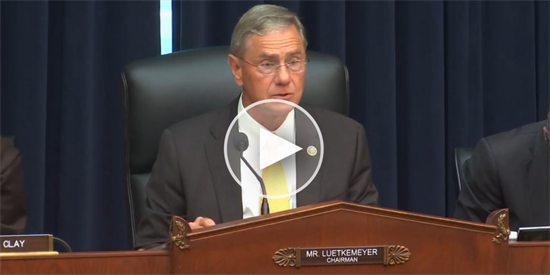Press Releases
Luetkemeyer: We Need Smarter, Streamlined Regulatory Regimes
Washington,
July 17, 2018
Congressman Blaine Luetkemeyer (MO-03), Chairman of the Subcommittee on Financial Institutions and Consumer Credit, delivered the following opening statement at a hearing entitled “Examining Capital Regimes for Financial Institutions.”
Last April, this Subcommittee held a hearing to examine the state of federal financial regulation and the impact regulators and their respective regimes were having on institutions, their customers, and the U.S. economy. Sitting on the front row of the dais were stacks of paper representing 20,000 to 30,000 pages the average bank submitted to the Federal Reserve for the annual CCAR review process. That’s 20,000 to 30,000 pages per bank, per year, just for CCAR. Fast forward a little more than a year and I’m pleased to report that, for the first time in a very long time, progress has been made and some relief has been granted. Thanks in large part to the effort of the members of this Committee and our colleagues in the Senate, and a President who champions regulatory reform, CCAR doesn’t burden nearly as many institutions as it did one year ago. While some relief has been seen, it’s widely recognized that there is more work to be done. In a January speech, the newly-minted Federal Reserve Vice Chairman for Supervision, Randy Quarles, outlined his vision by stating that “Simplicity of regulation is a principle that promotes public understanding of regulation, promotes meaningful compliance by the industry with regulation, and reduces unexpected negative synergies among regulations. Confusion that results from overly complex regulation does not advance the goal of a safe system.” Vice Chairman Quarles went on to indicate support for changes to the resolution planning process and stress test programs, acknowledging substantial progress made by financial institutions in the last few years. His quasi-predecessor, Governor Dan Tarullo, said in his departure speech last year “…the time may be coming when the qualitative objection in CCAR should be phased out, and the supervisory examination work around stress testing and capital planning completely moved into the normal, year-round supervisory process, even for the GSIBs.” While we didn’t agree on much during his tenure, Governor Tarullo and I had at least one thing in common: the idea that capital is a good thing. Capital protects institutions and, more importantly, consumers, against loss, and guards the financial system against threats of collapse. While I believe in robust capital requirements, I don’t think capital should be required to the point that it consolidates risk and eliminates choice in the marketplace for commercial and individual clients. The reality is that we still live in a world where the financial regulatory regime stifles growth and limits the availability of financial products. The new crop of federal financial regulators, in an effort to right-size regulation, are considering additional measures, including tailoring, to provide relief to institutions of all sizes. As they do so, I would first urge them to implement the statutory changes included in S. 2155 without delay, and to do so while closely adhering to what is clear Congressional intent. It’s time for the Federal Reserve to also conduct a holistic review and acknowledge that the world has changed since enactment of Dodd-Frank and finalization of the capital requirements on the books today. Such a review should include a consideration of equal and reasonable treatment for institutions with more than $250 billion dollars in assets, and for intermediate holding companies of international banks operating in the United States. These institutions should be subjected to tailored regulation that reflects the risk they pose to the financial system. Such steps would not only reflect the intent of Congress but also the Administration, evidenced most clearly through the recommendations issued by the Treasury Department since President Trump took office. It’s time to take the guessing out of capital planning and regulation. I’ve pressed leadership at each of the federal financial regulatory agencies to recommit to greater transparency and adherence to the requirements in the Administrative Procedures Act. We need smarter, streamlined regulatory regimes that promote not just transparency, but also effective taxpayer and systemic protections. ### |

